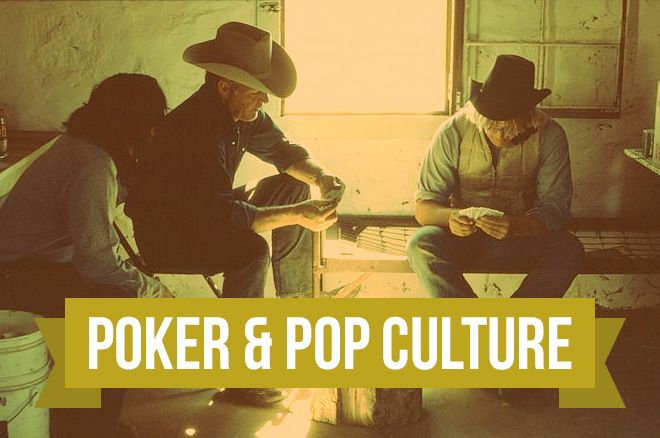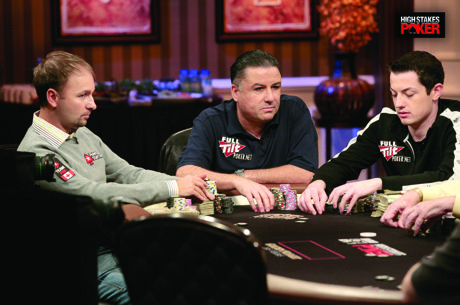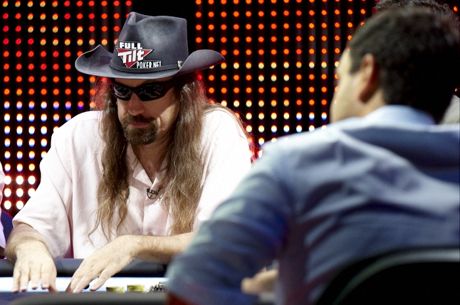Poker & Pop Culture: A Game That Is Immensely Destructive

Last week when looking at the first reference to poker in print — the first "hand report," as it were — we noticed it contained a lot of the same details that frequently turn up in later cultural representations of poker. It described a game played in secret, in the dead of night, culminating in an improbable four-aces-versus-four-kings showdown that suggested cheating might have occurred. Cursing and violence then punctuated the scene, spicing things up even further.
Other early references to poker similarly present the card game as unsafe for newcomers, helping further establish its dangerous reputation even as it first began to make its way up the Mississippi and across the still young, still developing country.
Speaking of being young, another writer who described some of the very first poker games specifically took it upon himself to shield the youth in particular from such a harmful activity. He knew what he was writing about, too, having inflicting plenty of harm himself as one of the first generation of card sharps.
An Early Warning Concerning the Perils of Poker
In 1843 there appeared a book with an ominous title page — An Exposure of the Arts and Miseries of Gambling; Designed Especially as a Warning to the Youthful and Inexperienced Against the Evils of That Odious and Destructive Vice.
Such an opener had to function a little like those "Viewer Discretion Advised" warnings at the start of a television show — you know, the type that make the shows irresistible to the very audience for whom the content is described as "unsuitable." Kind of an early version of "click bait" designed to get book buyers to stop and take a closer look.
The book was written by Jonathan Harrington Green, a self-described "reformed gambler" who had previously spent a dozen years at the gaming tables cheating at cards by a variety of means, including using marked decks and "shiners" or small mirrors to see cards as they were being dealt. Unlike the ambivalent author of the Dragoon Campaigns whom we were discussing last week, Green's unsubtle title tells us right away his intention — namely, to try to do everything he can with his book to dissuade readers from engaging in gambling games of all kinds, including poker.

Such a purpose in fact partially prevents Green from sharing certain particulars of how this relatively new game of poker is actually played. After all, he doesn't want to encourage his readers to learn it!
"I would that all were ignorant of it," Green claims amid wide-eyed exhortations to avoid poker at all costs, a game he believes to be an early step along a fateful "road to ruin" that starts with innocent pursuits like dominoes, checkers, and whist, then leads to faro, roulette, horse racing, cock-fighting, and worse.
Even so, Green does flesh out for his reader basic rules for Old Poker — the 20-card game derived from the French game poque featuring just a single deal with no draw, and one round of betting. He additionally explains how "there are no limits to the bets" and so the game "frequently... begins as low as a quarter of a dollar, and runs up to thousands in one or two minutes." He explains as well how as in the English game brag, poker can involve bluffing, insofar as "the man who has the most money will frequently bet so high on a poor hand, as to run his adversary off and win," a tactic he calls "a run off."
Green identifies the "southern and western portions of our country" as the most likely areas to encounter poker — including on steamboats — mentioning in particular a game played in New Orleans in 1835 (midway through his own tenure as a card sharp). He also notably describes "a game of full deck poker, which is played with the full pack of fifty-two cards," a change that would allow for more than four players to be dealt into a hand.
Green's own background fleecing travelers on the Mississippi (part of a more extensive criminal past) forces him to cast his narrative as the production of a now-rehabilitated sinner. As he explains, his experience uniquely qualifies him to warn us about poker and other similarly dangerous games, writing as he does from his new perspective of "having separated himself (and he trusts in God, forever) from that class of persons called gamblers."
Take a Seat, Someone Will Cheat
When it comes to poker, Green's warning to readers is twofold. Not only does playing the game mean risking the general moral degradation caused by all forms of gambling. Also problematic is the fact that the preponderance of cheaters in poker ensures "the uninitiated need never expect to win anything."
Furthermore, the then-more popular 20-card game affords more opportunities for cheaters than does "full deck poker," believes Green, since the reduced number of cards makes "it very easy to keep the eye on particular cards, and to stock them, and deal off particular hands."
Reading Green explain the cheater's method of "frequently giving out hands that are seldom got in the common course of fair play, and are seldom dealt out but by design," it is hard not to entertain the thought that he's given us an explanation for the Captain's good fortune versus the Major in that quad aces versus quad kings hand back in old Rodger's cabin in Dragoon Campaigns.
Even so, there's something disingenuous about Green's sensational handling of his subject, which like similar examples of heavy-handed moral instruction tends to be more exploitative than educational. Further encouraging our cynicism, Green's mercenary intentions would be more obviously signaled by his rapid production of more than a half-dozen other anti-gambling titles over the next two decades, a couple of which also refer to other poker games including one occurring as early as 1833.
Those books sold well, too, going through numerous editions and helped by Green's touring the country to promote them. "What he reaped at the gaming tables was probably small in comparison to what he made later from his staggering popularity as a lecturer and from [his] books," writes Henry Chafetz in a chapter on Green in his history of gambling in the U.S., Play the Devil.
Partly riding the wave of other reform movements of his era (including a burgeoning temperance movement, women's rights campaigns, and the abolitionist cause), Green's personal reform was especially well-timed — at once saving his soul and earning him riches.
"There was a time when this game was not so dangerous"
Even if we might not take the reformed gambler's warnings about cards as seriously as he'd like us to, Green's accounts of early poker games are nonetheless valuable for helping us try to pinpoint when and where poker first began to be played, as well as to help us gauge early cultural responses to the game.
Green establishes poker to have been an already popular pastime by the 1830s. In fact, he even suggests that by then the game had gone through a generation's worth of change to produce a kind of nostalgia for its earlier form.
"There was a time when this game was not so dangerous as it has come to be of late years," claims Green of this earliest version of poker.
"It was then common to see men of almost all classes amuse themselves at this game; and landlords would join their guests for social amusement," he continues. "Captains and other officers of packets and steamboats, generally, would engage freely in a game with their passengers for recreation. And little if anything was wagered or lost at the game, and all got up pleased, and seldom had any cause of dissatisfaction."
Ah, back in the day. Aren't we always talking about poker — and just about everything else — this way?
It's not a very convincing memory Green describes here, positing as it does the existence of a kind of "before-the-fall" version of poker in which players somehow competed without self-interest. (Imagine a world in which after every poker game "all got up pleased.") Against that idyllic backdrop Green contrasts the later corrupt player of "a game that is immensely destructive — perhaps more so than any another short game at cards now in use."
Then again, perhaps it isn't that outrageous to think of the earliest poker games being relatively free from later troubles caused by greed, dishonesty, and opportunism. Games often do start out that way, don't they? Until something happens to break the happy spell, anyway, a moment usually signaled by someone saying "Hey, I thought this was a friendly game!"
In any case, it's clear that by the time poker first began to be written about during the 1830s and 1840s, the game had been around long enough already to have developed a brief history with a subculture having already grown up around it — and with sides already being taken over whether or not poker should be considered an "odious and destructive vice."
From the forthcoming "Poker & Pop Culture: Telling the Story of America’s Favorite Card Game." Martin Harris teaches a course in "Poker in American Film and Culture" in the American Studies program at UNC-Charlotte.
Want to stay atop all the latest in the poker world? If so, make sure to get PokerNews updates on your social media outlets. on Twitter and find us on both and !









